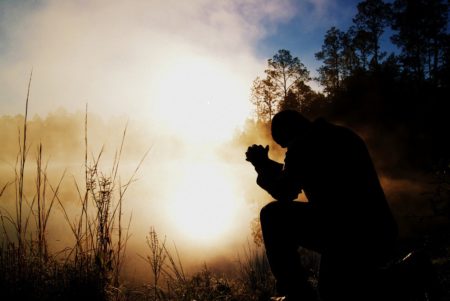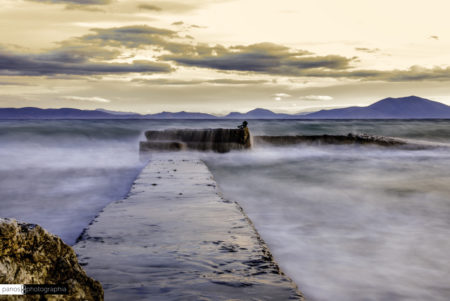It can be easy to live our lives disconnected from our passion and, as a result, from our God mission. That disconnect is often one of the things that keeps us following Jesus at a distance. But following as Jesus leads requires that we connect—or reconnect—with our passion; that we then discover our God mission, and act upon it. It requires that we be open to a little Pentecost—or a burning bush—in order to receive insight from God as to exactly how we are to follow.
The problem is that our God mission is almost always tremendously bigger than we are.
That’s exactly what Moses discovered.
As he was tending his father-in-law’s sheep, he experienced a little Pentecost. God captured Moses’ attention in a miraculous way— through an encounter with a burning bush—and gave him an amazing mission: “I am sending you to Pharaoh. You will lead my people, the Israelites, out of Egypt” (Exodus 3:10, NLT).
Moses had a hard time accepting his God mission because he, like us, had limited his destiny to what he believed he could accomplish with his own strength and resources. He was no longer an Egyptian prince; he was now a simple sheepherder. Moses tried to convince God to send someone else: “Who am I to appear before Pharaoh? How can you expect me to lead the Israelites out of Egypt? They won’t believe me! They won’t do what I tell them. I’m just not a good speaker. Lord, please! Send someone else” (Exodus 3:11; 4:1, 10, 13, NLT).
We struggle to follow Jesus closely, in sync with our God mission, because that mission is bigger than we can imagine. We are limited by our detailed lists of past failures, our internal sense of inadequacy, the unhealthy level of our self-esteem. We create a picture in our minds of what we will become, and it’s almost always smaller than what God intends.
Unfortunately, rather than picturing an unbelievable future, we often choose to place a limited picture in our mind’s eye. The picture that I held in my mind when I attended the evangelism conference was limited to the way I was doing ministry at that time. I couldn’t comprehend what God had in store for me because it was bigger than I could imagine and went far beyond common sense. That’s significant. As we seek to follow in the Jesus way, we need to recognize that more often than not, rather than being rooted in common sense, the Jesus way defies common sense.
How many times have we limited ourselves to the pictures created by common sense? “I could never do that; I’m too old; my children are too young; I don’t have the right degree.” Jesus shakes his head and says, “Didn’t I tell you that you will see God’s glory if you believe?” (John 11:40, NLT)
We follow an awesome God! A God who can do great things with limited resources. This means that our life mission isn’t about what we can imagine about ourselves. It is about what God imagines about us. When we imagine ourselves, our response to the mission God sets before us is often: That’s impossible! I’m not smart enough! I’ve been divorced! I’m in recovery! I’m this…I’m that…I’m not this…I’m not that!
But God says that none of that matters. None of that matters because our life mission isn’t about what we can do for God. Our life mission is what God is going to do through us.
Remember Moses? “Who am I to appear before Pharaoh?” (Exodus 3:11, NLT)
God says, “It’s not about what you can imagine about yourself. It’s what I imagine about you.” God says, “It’s not about what you can do for me; it’s what I am going to do through you.” That revelation was at the heart of Moses’ burning-bush experience. We follow an awesome God; and when we choose to follow side by side, rather than at a distance, we experience God’s power to take the ordinary and make it extraordinary. That’s what happened to Moses and to the disciples, and that’s what happens to us.
Moses tells God that he can’t speak well, that he gets tongue-tied, that he stutters (Exodus 4:10). What is God’s response? “Who makes mouths? I will be your mouth. I will give the words” (Exodus 4:11, NLT). Similarly Peter, who before Pentecost barely knew what to say or when to say it, is empowered to speak eloquently to the crowds all over Jerusalem (see Acts 2:1-42).
God takes the ordinary and makes it extraordinary. God puts words in our mouths and transforms the ordinary elements of our lives into powerful tools. Moses’ biggest weapon, the source of extraordinary signs and miracles as he argued with Pharaoh to free God’s people, was an ordinary shepherd’s staff. Moses went up against Pharaoh, ruler of the most powerful kingdom on earth at that time, armed with the stick he had used for forty years herding his father-in-law’s sheep.
The reality of following in the Jesus way doesn’t consist of what you can do for God. It consists of recognizing what God can do through you. The question we must ask ourselves is not, “what can I give God?” but “what is God doing? How can I be a part of what God is doing?”
When we follow Jesus side by side, we don’t wait until we have everything figured out. We don’t wait until our life picture has been filled in with every detail. We act on what we know and trust that God’s picture is infinitely greater than our own. We act on the glimpses we receive of the light of God’s truth, trusting that God is working through us. We follow at a distance when we hear the truth of God and wait rather than walk; but the Jesus way involves action—breaking ranks, risking the radical, attempting the impossible.
Moses’ life mission was about achieving God’s purpose for God’s people. Moses lived in sync with that mission, not by focusing on self-fulfillment or self-actualization, but by allowing God to work through him. Jesus promised that “rivers of living water will brim and spill out of the depths of anyone who believes in [him]” (John 7:37, The Message). We follow in the Jesus way in order to serve: to become a source of refreshment and healing and creativity to everyone around us.
Perspective comes when we refocus on God, who has promised to be with us, to be our mouth, to be our resource, to be our strength. Perspective comes when we refocus to see that following Jesus with integrity makes each of us a witness; and witnesses cannot hide in the shadows. Witnesses tell the truth about what they have seen and experienced.
God has placed a purpose within you, a life mission. Following Jesus is about discovering that life mission. It’s guaranteed to be bigger than you can imagine, but God has surrounded you with all the tools you need to accomplish it. God also desires to work a miracle through you for another person. We may not have it all together; we may have pain or shame. But it’s not how we imagine ourselves, it’s how God imagines us. We walk in the light—now. We don’t wait. We simply take our ordinary lives, add our experience of Jesus in real time, and allow God to create a mighty work through us.
 The yet is what prompts me to answer the questions with my own.
The yet is what prompts me to answer the questions with my own. 








